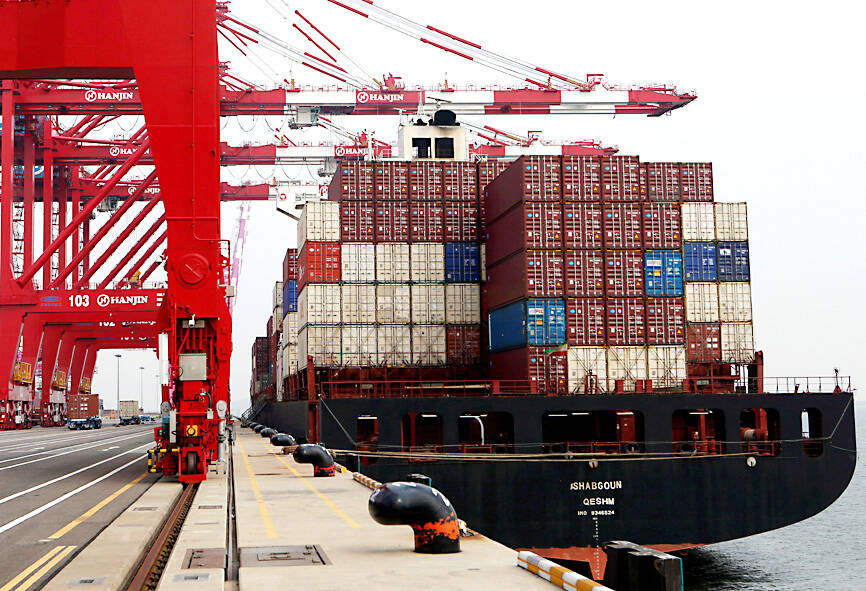South Korea’s exports returned to growth on the back of continuing demand for semiconductors, in a positive sign for policymakers seeking to shore up the trade-reliant economy against any potential headwinds from US president-elect Donald Trump’s tariff plans.
Exports adjusted for working-day differences rose 3.6 percent last month from a year earlier, rebounding from a dip in the prior month, data from the South Korean Ministry of Trade, Industry and Energy showed yesterday. Headline exports climbed 1.4 percent while imports decreased 2.4 percent, resulting in a trade surplus of US$5.6 billion.
Semiconductor exports increased 30.8 percent from a year earlier to US$12.5 billion, the trade ministry said. Still, it was the slowest growth since late last year.

Photo: REUTERS
South Korea is one of the world’s most export-reliant nations, and its vulnerability to protectionism has raised concerns among policymakers and business leaders in Seoul after Trump vowed to increase tariffs on trading partners.
While South Korea might be subjected to universal tariffs of just 10 percent, it could also sustain indirect damage from larger duties targeting some of its key trading partners. Trump has pledged 60 percent charges for China, South Korea’s biggest trading partner.
The Bank of Korea on Thursday slashed its benchmark interest rate in a surprise back-to-back move aimed at girding the economy for any potential headwinds stemming from Trump’s return to the White House next month.
The central bank has already voiced concerns about a softening in the export growth of technology products. South Korea is home to two of the world’s biggest memory chip manufacturers, and its businesses are widely embedded across global technology supply chains.
“Trump’s return to the White House suggests a tumultuous period lies ahead, with higher US tariffs and fresh US-China trade frictions impairing the smooth flow of goods and the functioning of supply chains,” Dave Chia, an associate economist at Moody’s Analytics, said in a note. “As a key US and China trading partner, South Korea could be caught in the middle.”
Demand from both China and the US slipped last month. Shipments to China edged down 0.6 percent from a year earlier while those to the US fell 5.1 percent, the trade ministry said.
Separately, South Korea has the capacity to purchase more US energy, which is competitive in cost with Middle East imports, Yonhap News yesterday cited Minister of Trade, Industry and Energy Ahn Duk-geun as saying.
Ahn told Yonhap that the country needs to expand US imports to reduce trade surplus with the US and plans to fold it into policy “constructively,” while private companies can take it into consideration as part of their business strategies.
The minister’s comments suggest South Korea will seek to encourage US energy imports through government-run firms and private refiners, Yonhap said. US gas and oil prices are “reasonable,” making it easier for South Korea to procure them, Ahn told Yonhap.
During Trump's election campaign, he vowed to narrow trade deficits with other countries through tariffs and increase US oil and gas production to establish what he called energy dominance.

South Korea’s equity benchmark yesterday crossed a new milestone just a month after surpassing the once-unthinkable 5,000 mark as surging global memory demand powers the country’s biggest chipmakers. The KOSPI advanced as much as 2.6 percent to a record 6,123, with Samsung Electronics Co and SK Hynix Inc each gaining more than 2 percent. With the benchmark now up 45 percent this year, South Korea’s stock market capitalization has also moved past France’s, following last month’s overtaking of Germany’s. Long overlooked by foreign funds, despite being undervalued, South Korean stocks have now emerged as clear winners in the global market. The so-called “artificial intelligence

NEW IDENTITY: Known for its software, India has expanded into hardware, with its semiconductor industry growing from US$38bn in 2023 to US$45bn to US$50bn India on Saturday inaugurated its first semiconductor assembly and test facility, a milestone in the government’s push to reduce dependence on foreign chipmakers and stake a claim in a sector dominated by China. Indian Prime Minister Narendra Modi opened US firm Micron Technology Inc’s semiconductor assembly, test and packaging unit in his home state of Gujarat, hailing the “dawn of a new era” for India’s technology ambitions. “When young Indians look back in the future, they will see this decade as the turning point in our tech future,” Modi told the event, which was broadcast on his YouTube channel. The plant would convert

‘SEISMIC SHIFT’: The researcher forecast there would be about 1.1 billion mobile shipments this year, down from 1.26 billion the prior year and erasing years of gains The global smartphone market is expected to contract 12.9 percent this year due to the unprecedented memorychip shortage, marking “a crisis like no other,” researcher International Data Corp (IDC) said. The new forecast, a dramatic revision down from earlier estimates, gives the latest accounting of the ongoing memory crunch that is affecting every corner of the electronics industry. The demand for advanced memory to power artificial intelligence (AI) tasks has drained global supply until well into next year and jeopardizes the business model of many smartphone makers. IDC forecast about 1.1 billion mobile shipments this year, down from 1.26 billion the prior

People stand in a Pokemon store in Tokyo on Thursday. One of the world highest-grossing franchises is celebrated its 30th anniversary yesterday.